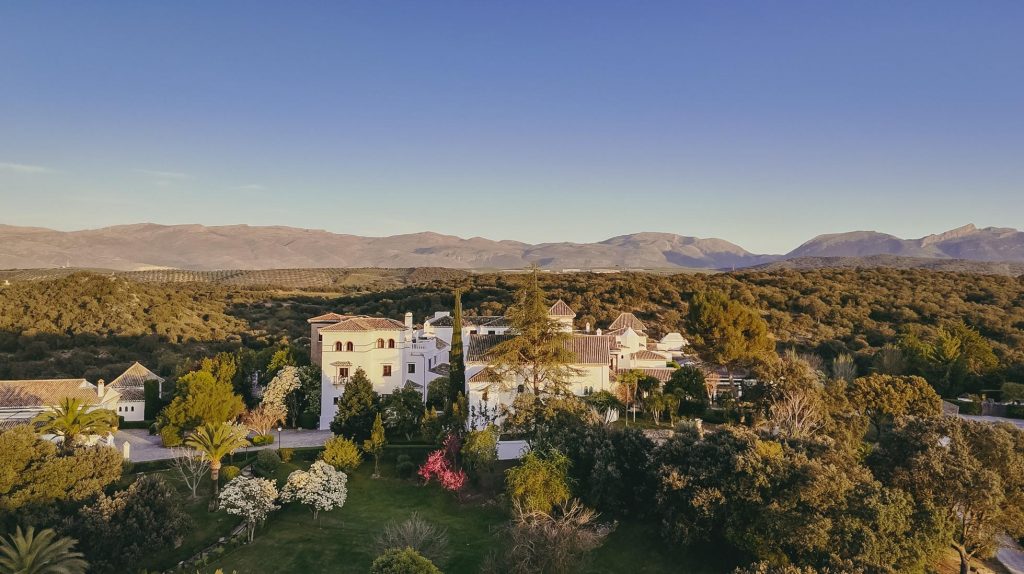Toward the end of the last century, a great many hacienda hotels were constructed in southern Spain in a style that was meant to look old. Their architecture was oriented around central cobbled plazas and decorative fountains—a constant reminder of the Moorish roots of Al-Andaluz. Their windows had heavy iron bars in spite of the modern security systems that rendered them unnecessary. Their terra-cotta floors had a ready-made patina. Finca La Bobadilla is one of them.
It’s tempting to dismiss the whole lot of them as fake. But in the case of La Bobadilla, that would be missing the point. It’s true that no Victorian-era love affairs unfolded here, that no families hid out during wartime, that the entire thing was just fields half a century ago. But La Bobadilla is not fake. Its Andalusian hospitality is as real as it gets.
In the 1980s, three Swiss travelers fell in love with Andalusia and bought about 750 acres of land north of Málaga with an eye toward tourism. They started with a restaurant, then opened a hotel with 15 rooms, then added more and more until they had a resort of 73 rooms on nearly 1,800 acres to provide more privacy.
They were “selling Andalusia,” says La Bobadilla front of house manager Jaime Estellés. They weren’t shy about repeating their references: The courtyard, with the (unconsecrated) chapel as its highest building, resembles so many nearby villages. The intricate arches of the lobby ceiling are modeled on the famous mosque-cathedral of Córdoba. Little reflecting pools and fountains evoke the Alhambra.
Estellés joined the hotel earlier this year, when it became part of Único Hotels, Barcelona-based hotelier Pau Guardans’ new collection of eight ultra-boutique properties around Spain. Guardans, the founder and former CEO of AC Hotels, “looks for special locations,” says Estellés. “He likes locations in the middle of nowhere,” the better to connect his guests with nature.
And so, even though the hotel makes a handy base for day trips to Málaga, Córdoba, Seville and Granada, its essence is that of rural Andalusia. Native forest slopes down the surrounding hills of the Sierra de Loja. Silvery green olive groves produce the oil that’s served in the hotel’s three restaurants. New stables house a half-dozen Andalusian horses, a nod to the equestrian traditions of the region. (But lavender, honey and the refreshing house wines come from Único’s excellent hotels in Mallorca.)
The place wears its age comfortably, but there are plans for a down-to-the-walls refresh of the guest rooms during its annual closure later this year. (The last closure of the sort, they promise; there are plans to go year-round.) This will replace the 1990s geometric pastels with a modern “calm” style—there were lots of flying linen curtains on the mood boards. It’s already on display in the lobby, where everything is nubby textures, soft colors and Assouline Travel Series titles.
But the materials are somewhat immaterial. “The employees are the important piece,” says Estellés, noting that quite a few have been here since the 1980s or ’90s. Even the newer hires work with a relaxed confidence and genuine warmth. They live up to that classic-hotel cliché of forming quasi-friendships with the repeat guests—some of whom have repeated so many times that their preferred guest rooms now bear their names.
(No word yet on how those loyalists will respond to the upcoming renovations, but the designers are aiming for an evolution that won’t alienate the old guard.)
Along with the warm hospitality, Único is upping the experience quotient of the hotel, even adding a kids’ spa and pickleball courts for its American target market. There’s an extensive spa for grown-ups, weekend yoga classes, walking trails and a fleet of electric to explore the grounds (now back down to about 700 acres), and various enclaves that can be set up for winsome picnics of jamón ibérico, local manchego, fluffy tortilla and fresh salads with tinned tuna.
They’re organizing celebratory theme nights, where chefs grill meats or cook big pans of rice in the courtyards, the better to keep guests entertained onsite. But they’re also going all-in on the off-campus experiences. A standout is a visit to the nearby Riofrío, the first certified organic caviar farm in the world, where guests can clamber into the tanks with the sturgeon before tucking into guided tastings of the eggs.
That caviar isn’t regularly on the menu at Finca La Bobadilla, but there are plenty of other good things to eat. The fine dining restaurant, La Finca, holds a Michelin star, even as veteran chef Fernando Arjona and his team have loosened things up, moving away from a long tasting menu toward a relaxed a la carte approach. At lunchtime, the poolside El Mirador has a somewhat lighter and healthier Mediterranean menu.
And at the heart of the hotel, there’s Bar La Plaza, modeled on the lively gathering places of traditional villages. The gourmet tapas menu hits all the classics—croquettes, gilda skewers (anchovies, olives, and hot peppers), partridge salad with escabeche (pickled onions and sweet peppers), Russian salad with anchovies—and the execution is solid.
Sitting on the terrace, beneath the fairy lights and the stars, with a plate or two and a glass or two, continues centuries of Andalusian life. It doesn’t matter when anything was built. Maybe purists will still call some of it fake. But it all feels undeniably real.

